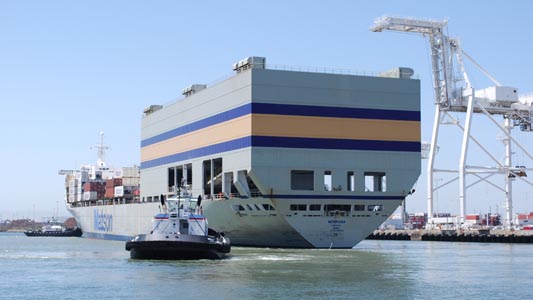Port of Oakland staff provided a progress report on the port’s policy strengthening efforts to the Oakland Board of Port Commissioners at the regularly scheduled public board meeting recently.

In an effort to strengthen accountability, the Port of Oakland has instituted a new purchase card policy, employee ethics training and other policy changes—all oriented toward changing the port culture to one that adheres to higher standards of ethics, accountability and transparency. Photo by Joel Williams
By Patrick Burnson
Published: May, 2013
Port of Oakland staff provided a progress report on the port’s policy strengthening efforts to the Oakland Board of Port Commissioners at the regularly scheduled public board meeting recently. Updates included a new purchase card policy, employee ethics training and other policy changes—all oriented toward changing the port culture to one that adheres to higher standards of ethics, accountability and transparency.
"It’s a milestone relative to the commitment that we made to the public to become a more accountable and transparent organization," said Acting Executive Director Deborah Ale Flint. She added that these policies do not require board approval.
As Bay Crossings reported late last year, the port’s self-assessment began with its strategic planning process in 2009-2010, and then accelerated in fall 2012 when its staff learned that top leadership was involved in what was perceived as an abuse of expense accounts.
"We recognized that there was a gap in our policies that allowed areas of the port to function in a way that did not align with our core values as an organization," said Flint. "We recognized that we needed to look at our policies in a comprehensive manner so that we could make changes in a more meaningful way to transform our organization."
New Report Discusses Use of
Ocean Cargo Emissions Data
A new report published by BSR’s Clean Cargo Working Group highlights corporate practices in using ocean transport emissions data.
BSR conducted interviews with Clean Cargo shippers—companies buying transportation services—to find out how they use Clean Cargo emissions data, how they integrate this data into their business processes, and what benefits they receive from being part of the group.
Highlights include:
• Procurement decision-making: 78 percent of shippers use Clean Cargo emissions data to inform their procurement decision-making process.
• Sustainability reporting: 56 percent of shippers use Clean Cargo emissions data either in their sustainability performance reporting or for other uses, such as to calculate their own carbon footprint, as well as the supply chain carbon footprint of their customers.
• Intermodal transport comparison: Shippers highlighted that Clean Cargo emissions data enables them to compare different modes of transportation, and make informed decisions where it may be possible to shift certain flows to ones with lower emissions.
Ag Shippers to Meet in S.F.
The Agriculture Transportation Coalition, which hosts the largest annual gathering of ag shippers sourcing and delivering to foreign markets, will meet in San Francisco at the Hotel Nikko on June 12-14.
Among the highlights of the event will be the export compliance workshop, which will examine the final rules for export documentation. Other topics to be covered include:
• Expansion of licensing options for ag products to Cuba, Iran, Sudan, etc., but watch out for the remaining pitfalls.
• C-TPAT for exports: Are there any benefits to the ag exporter and the trucker, rail and ocean carrier handling ag cargoes? What will it cost to certify the security of your entire supply chain, from source points to final delivery overseas? Will it be voluntary?
• Incoterms 2010: Who is responsible for tasks, fees or documentation?
• Navigating exports: I have a salesperson that has sold to a country on one of the denied lists? How do I know if and how to work with these countries?
• Shipping to a new country or a new consignee: How do I map thru the obstacle course of unknowns?
Oakland-Based Tech Company Updates ChassisManager Program
International Asset Systems (IAS), an Oakland-based technology company serving the ocean container industry, announced new developments to the "ChassisManager" program.
Last month four ocean carriers (OOCL, Cosco, Hyundai, Hanjin) began sending data that determines if a chassis trip should be billed to the ocean carrier or to the motor carrier using the chassis.
According to IAS spokesmen, these ocean carriers join others already using simpler business rules within ChassisManager. Additional ocean carriers are scheduled for onboarding over the next two months. HRCP and IAS have worked closely with the ocean carriers to translate the very complex exception-based billing rules into clear invoicing information in the ChassisManager system. The most recent update to the application provides advanced visibility as to how these moves are being billed.

